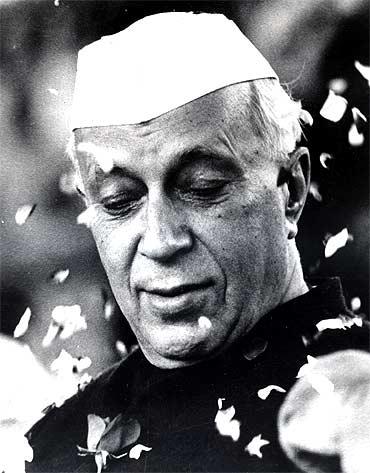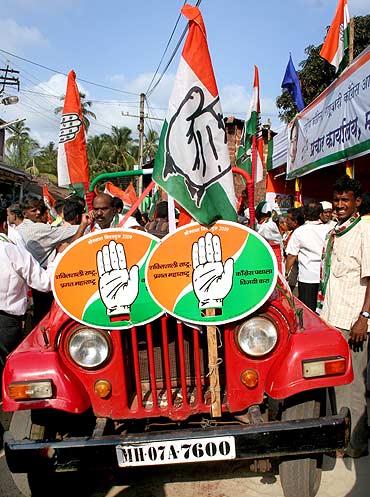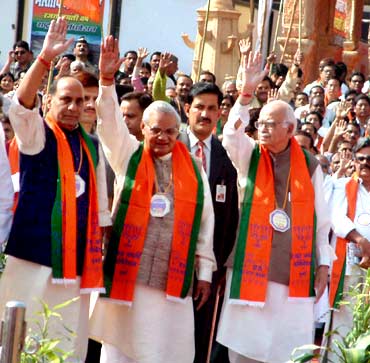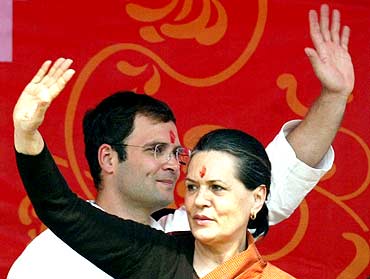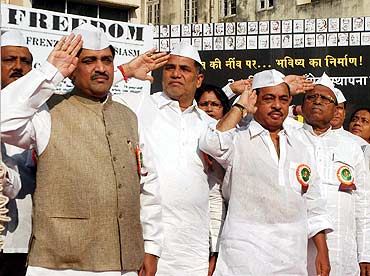 | « Back to article | Print this article |
'Gandhi was a greater Indian than Nehru'
In the first part of this fascinating interview, historian Dr Ramachandra Guha, author of India After Gandhi: The History of the World's Largest Democracy spoke about the making of the Congress party, its historic journey and deciphered the nuances of its core philosophy as the Grand Old Party celebrates it 125th year in existence.
Part 1 of the interview: 'The Congress, historically, has been inclusive'
In the concluding part of the interview, he tells rediff.com's Sheela Bhatt what the Congress means for India today, what could lurk for the party in the future and the importance of Sonia Gandhi and Rahul Gandhi.
How would you assess Jawaharlal Nehru's legacy as prime minister?
In Nehru's case his balance-sheet as prime minister is certainly very positive. He nurtured a democratic India. He promoted a plural ethos and the reform of Hindu personal laws giving equal rights to women. These are great things.
He had two weaknesses, I would say. Not the China war... That was inevitable. India and China were two countries emerging out of colonialism. They were both trying to find their core character and conflict was inevitable.
One of his major weaknesses was institutional. Nehru neglected primary education. He had great fascination for higher education, IITs, IIMs, nuclear physics, etc. If he had focused on primary education, then I think many of the problems that we see today such as unemployment, violence in young men, caste conflicts would have been much less intense.
That was his major institutional failure. Then there was a personal failure. In retrospect, I think, he should have retired in 1958. He thought about it. He went to Kashmir for three weeks. The process of transition of power would have been complete in his lifetime.
Mahatma Gandhi nurtured younger leaders such as Sardar (Vallabhbhai) Patel, Nehru, Rajaji (C Rajagopalachari), and others. Nehru could have likewise mentored younger leaders.
We don't know why he didn't retire in 1958. People may have told him that he was indispensable.
Now, similarly, the Congress in 2010 is at the crossroads. If (Congress President) Sonia and (her son, Congress General Secretary) Rahul (Gandhi) think they are indispensable then the prospects are not good for the party and the country.
How do you see that famous debate over differences between Nehru's idea of secularism where he said religion should remain confined within homes and Gandhi's deep faith in the religious self of the person?
I see the approaches as complementary. Both Nehru and Gandhi believed that India should not be a Hindu Pakistan. They believed in equality of all religions where Hindus and Muslims had good relations. You need both their perspectives.
You need Nehru's vision at the level of the State, in the government and in public policy which should be totally impartial. The Gandhian perspective you need at the level of civil society.
Gandhi believed in inter-faith harmony and all-religion prayer meetings. After the 1992 riots you had mohalla (area) meetings; that was a Gandhian initiative.
At the state level you have to be above religion and stay neutral. Rajiv Gandhi was being foolish when he pandered to Muslim and Hindi fanatics. He had bad advisors. First, (then Union minister) Z A Ansari told him that you will lose the Muslim votes in UP so overturn the Shah Bano judgment and then (then Union minister)Arun Nehru told him you are losing Hindu votes so he opened the locks in Ayodhya!
The country paid heavily for these mistakes.
As a historian I would say, one of the problems with this (Nehru-Gandhi) family's rule is this hero-worship of Rajiv Gandhi and Indira Gandhi. They never mention the Emergency, they never mention Shah Bano.
I just had an e-mail exchange with a minister I know who gave all the credit to Indira Gandhi for some initiative. Actually, many other people had contributed to it.
This sycophantic puja of Rajiv and Indira Gandhi is crossing all limits. Hyderabad airport should have been named after an Andhra leader, and the Bandra-Worli Sea Link (in Mumbai) should have been named after (former Union defence minister and legendary Maharashtra leader) Y B Chavan. Why are they named after Rajiv Gandhi? I find this kind of sycophancy very disgraceful.
You are well-known as a fan of Nehru.
I am not a fan only of Nehru. There has been so much vicious and unfair criticism of Nehru in recent years. So I am trying to understand Nehru's contributions in the making of our nation.
I am not a Nehruvian. I admire Gandhi more than I admire Nehru. Gandhi was a greater Indian than Nehru. I admire Sardar Patel and B R Ambedkar as much as Nehru. I think they collectively built the Indian nation. However, I am against the current vilification of Nehru.
'The Congress is the only party with a national presence'
That is Indian politics in general. It is not just the Congress. Look at H D Deve Gowda and even the Bharatiya Janata Party now. The political class as a whole has succumbed to glamour, wealth, celebrity status and luxuries. It is a much wider phenomenon. The Congress is definitely part of it.
When India attained freedom, how did the Congress manage the north-south balance?
That was Gandhi's greatness. Gandhi recognised the issue of north and south and that was the reason he chose Nehru as his political successor rather than Patel or anyone else. (Historian and the Mahatma and Rajagopalchari's grandson) Rajmohan Gandhi has done a very good analysis of this choice.
Gandhi chose Nehru because he represented a pan-Indian identity. Nehru was a north Indian trusted by south Indians. A Hindu, who was friendly to Muslims. A man whom women admired. Whatever his greatness, Patel was a Gujarati man. Rajagopalachari was a Tamil-Brahmin. Rajendra Prasad was a Hindi-speaking guy from Patna.
Even Nehru was a Kashmiri Hindu.
But Nehru had that (pan-Indian) appeal. Gandhi saw that the Congress had to be an all-India party and must appeal to all castes, communities and linguistic groups. For these reasons Nehru was chosen.
I saw some correspondence between Nehru and Rajagopalachari after the 1952 election when the first Cabinet was formed. Rajagopalachari was then chief minister of Madras (state). Nehru wrote, 'Give me some names of south Indians. I have too many north Indians in the Cabinet.'
Rajaji gave a few names, but Nehru said, 'These are good names but there are too many Brahmins, I want some non-Brahmins.' He then went on to choose a Dalit woman from Tamil Nadu for his Cabinet. I think the Congress had this sense of inclusiveness.
Nehru and Gandhi had many similarities, but people choose only to highlight their differences. Both were truly non-parochial. They took the whole of India as their homeland. They took care of the south, other religious communities, low caste and women.
That is why no other Indian party is able to build an all-India constituency. Rajaji tried to build the Swatantra Party, but it was seen as too right wing belonging to people with property. The BJP tried, but it is seen too upper class-Hindu-oriented. There have been many regional challenges to the Congress, but in the 125 years of its existence there has been no national challenge.
Even now I can't see any national challenge to the Congress emerging. We do see regional challenges like the Akali Dal in Punjab, the DMK (Dravida Munnetra Kazhagam) in Tamil Nadu and the Left parties in Kerala and West Bengal, but they are fragmented.
The Congress has got this extraordinary status of being the only party with a national presence.
'Who will trust the BJP as a young and modern party?'
Lots of people have this view of the Congress. I wish we had a political party to challenge the Congress. That would offer the people of India a wider vision of how this country should be built. But we don't need polarising issues. Such criticism comes from people who have a polarised vision.
I come from Karnataka. In the last election, the BJP put up 224 candidates but not one Muslim. Almost 15 percent of the population of Karnataka is Muslim. So you are telling 15 percent of Karnataka you don't count for us. Then how can you blame them for voting for the Congress? The BJP originally, said, 'appeasement of none, recognition of all.'
But they never followed it. In Karnataka they attacked Christians after the Muslims in Gujarat. They had only one woman in the cabinet and she too has been sacked. So what message are they sending?
Is this the alternative to the Congress? The Congress can be a cynical manipulator. It plays one community against the other, okay, but, what are you offering that is better?
In the course of debate, some Congress leaders ridicule lots of characteristics of India.
That's not true. The danger in your comment -- that idea that there was greatness in Indian or Hindu civilisation is like that the Ganga it is immortal, pure and beautiful. Like the Ganga that is polluted from source to sea, Hindu civilisation was polluted. Hindu civilisation practised the most degrading form of social behaviour called untouchability.
Hindu civilisation oppressed its women. In Hindu civilisation there was division of manual labour and mental labour.
The greatness of Gandhi, Nehru and Rabindranath Tagore was that they became critics of their culture. I would rephrase your question and say that as Hindus we were fortunate to have reformers like Gandhi, Ambedkar, Nehru and so on. They pointed to the weaknesses and fault-lines within Hindu culture and civilisation.
By the way, more Hindus vote for the Congress than the BJP so, obviously, they find something attractive in the Congress.
Do you think in the coming decades the BJP will form a national challenge to the Congress?
I don't think so. It has fallen back to the RSS (Rashtriya Swayamsevak Sangh). I think it's possible that in 20 or 30 years time we may see a new political formation. It is possible a middle-class formation which is not captive of one family or one religion or one caste may emerge.
The BJP had a great chance to become a national party, but it has lost it. During Atal Bihari Vajpayee's time, even at the time of the last election they had a chance to grow, but they always go back to the RSS.
When the Jaswant Singh crisis happened, (former deputy prime minister and then Leader of the Opposition in the Lok Sabha) L K Advani went to see (RSS chief) Mohan Bhagwat who is head of a social-cultural organisation.
Who will trust the BJP as a young and modern party?
'Sonia has been central to the Congress revival, but there is a negative side too'
After reading the Congress's history so well are you surprised by the way in which Sonia Gandhi has taken control of the party in the last ten years? Are you surprised to see the way she has grown and established herself?
I think she is a person of great determination. She has worked very hard. In the revival of the Congress she has been central. But there is a negative side also.
I see that a culture of chamchagiri (sycophancy) has flourished under her. There is a darbari (court) culture, there are chamchas around her. That is not healthy for any democracy.
That is not healthy for the Congress. It is not healthy for India that you have a situation where the prime minister has to come through the Rajya Sabha. He is totally dependent on her. He can not make Cabinet appointments without her approval. I think, there are problems. There are problems in the ways the Congress is run today.
Do you think its basic ideals remain strong today?
I don't know. I can only say about the Congress is that it is not as bad as its alternatives. It is less bad. You cannot say it's a healthy, democratic, well-functioning political party.
Look at world leaders like German Chancellor Angela Merkel. How did she come to the top? In democracies political parties have to be open, transparent and secular institutions where anyone can enter. When they put in hard work and talent they can rise.
Look at how Barack Obama and Merkel came up. In the Congress, unless you are close to Sonia and Rahul Gandhi you will not progress. This is well established. We should know that the culture of sycophancy is undemocratic and foreign to the Congress culture. For 80 years the Congress did not function in this way.
Congressmen think that without the Gandhi family they will disintegrate.
Maybe they should have a process of churning and they should rediscover themselves. I can't say that it's a happy situation. Because, it amounts to feudalism and it's not democracy. It is similar to a monarchy where Sonia Gandhi is the queen and Rahul Gandhi is the rajkumar (prince). That is not democratic.
Do you find hope in Rahul Gandhi?
I have never met him. I don't know him. I think we should give him the benefit of doubt. I think he has good intentions. It seems he recognises that this chamchagiri and sycophancy is the problem.
He has done a sensible thing by not entering the Union Cabinet and continuing with his political apprenticeship for a few years more which his father didn't do. But I don't think he is particularly intelligent.
I don't think he has the vision that Nehru or Patel had. But that's okay. He is open-minded. What we may wait and see is that whether he has drive and determination. As we say, dum hai kya is ke pas (does he have fire within him)?
Narendra Modi and Mayawati have dum. I think his mother Sonia Gandhi has it.
The second thing is whether he can resist sycophants and flatterers and stay out of the prime ministerial race. For the long-term health of the Congress and the country, the dominance of one family must end.
Nothing should stop Rahul Gandhi from working sincerely for the party. However, the idea that he is, always, the most important person in the party is not good for the Congress. The least noticed aspect of family rule in the Congress is how other parties have followed it.
This was once the greatest political party in India. Once Indira Gandhi brought Sanjay and Rajiv into politics, the Akali Dal, the Shiv Sena, the DMK, all started the same practice.
The greatest political party of the country gave legitimacy in the country by shamelessly promoting family rule. The DMK started as a reformist party, the Akali Dal also started a movement against corruption and cleaning up the gurdwara management. Now they have followed Congress-style family rule. This is greatly damaging Indian democracy.
'The Congress will have to get rid of family rule'
Of course! These are the serious charges. The top leadership of Congress has turned a blind eye to corruption. Even if Sonia Gandhi and Manmohan Singh are not corrupt, how much corruption goes on through their ministers and through their allies?
It is well known that most ministers in the central government are corrupt. The charge of corruption against the Congress is valid. Corruption is one of the reasons holding back our economic growth.
Due to corruption access to the social services to the poorer sections is denied or hampered. Talking about the second charge (of soft-Hindutva and Muslim appeasement) particularly, Rajiv Gandhi was guilty of it. In the 1980s, he was found of pandering to fanatics of both religions.
First he overturned the Shah Bano judgment and then, he opened the locks in Ayodhya. We are still paying for it.
Now, fortunately, it seems that communal polarisation is on the decline. People are realising that Hindu-Muslim violence is in nobody's interest. But for 20 years the country had to pay for those two costly mistakes of Rajiv Gandhi.
A BJP leader once told me that Indians endure the corruption of Congressmen because it is the tax you pay for buying the Congress view of secularism. The minorities have no other alternative because they think the Congress is secular.
I disagree. Corruption is a human weakness.
Some people see the Congress as this huge machine that gets power through electoral politics because the ideas behind the Congress has eroded.
Agreed its ideals have declined, but the ideals of the other parties have declined faster.
Do you see the future of the Congress party as quite strong?
In this celebration of 125 years of the Congress party, it will be interesting to see how much they recall their leaders like (legengary Tamil leader K) Kamaraj, Rajagopalachari, Sardar Patel, (socialist icons)Jayaprakash Narayan, Ram Manohar Lohia and Acharya Kripalani, Kamaladevi Chattopadhya etc.
It will be the test of the Congress party's honesty as to how much they recognise the contributions of other leaders apart from Nehru, Indira Gandhi and Rajiv Gandhi.
I think what you should debate in the final round is that it is unhealthy for the Congress party to depend on one family.
It is unhealthy for Indian democracy to have only one national party.
